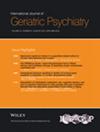All-Cause Acute Illness Hospitalisations in the Preceding Two Years Are Associated With Cognitive Decline in Older Adults: The Sydney Memory and Ageing Study
Abstract
Objectives
Emerging evidence suggests all-cause acute hospitalizations are associated with cognitive decline, rather than being associated only with specific inpatient contexts (surgery, critical care and delirium). This study clarifies this association in an Australian context.
Methods
This study is a secondary analysis of four biennial waves of prospective population-based neuropsychological measures from 1026 functionally independent Sydney Memory and Ageing Study participants aged 70–90 years at baseline, and contemporaneous probabilistically-linked hospitalization data. The outcome measures were global cognition baseline (intercept) and change (slope) and their associations with hospitalization episodes and cumulative length of stay (cLOS) variables in five consecutive 2-year time intervals.
Results
One thousand twenty-six individuals had a mean age of 78.8 years, a mean Mini-Mental State Examination score of 28.7, a mean of 3.3 hospitalizations and 18.9 days in hospital over 10 years. Mean global cognition z-score change/year was −0.133, adjusted for age, sex and education. Hospitalizations and cLOS in the final time interval were associated with a change in slope of −0.012 global cognition z-score/hospitalization/year (Standard Error [SE] = 0.005, p = 0.014) and −0.002 z-score/day-in-hospital/year (SE = 0.001, p < 0.001). Further investigation of these associations with time-lagged models showed that pooled recent hospitalizations were associated with accelerated cognitive decline of −0.036 change in cognition/year/episode-of-hospitalization (SE = 0.012, p = 0.004) and −0.008 change in cognition/year/day-in-hospital (SE = 0.002, p < 0.001) rather than non-recent hospitalizations (Wald test for difference between pooled recent and non-recent effects had p-values of 0.011 and < 0.001 for hospitalization episodes and days respectively).
Conclusions
This study confirms and adds nuance to international findings that overnight hospitalization is associated with accelerated cognitive decline. This association was dose-dependent, had a recency effect and was independent of illness severity in the case of cLOS. These findings suggest that all-cause acute hospitalization may be a reversible risk factor for cognitive decline. This needs further clarification and the development of interventions to minimise the impact of acute illness hospitalization on cognitive trajectory. To this end, broadening the scope of acute care in the home and the prevention and treatment of neuroinflammation are priorities for further investigation.


 求助内容:
求助内容: 应助结果提醒方式:
应助结果提醒方式:


